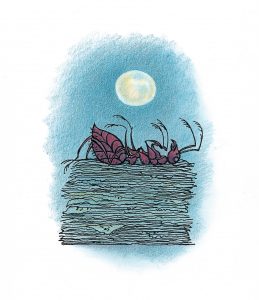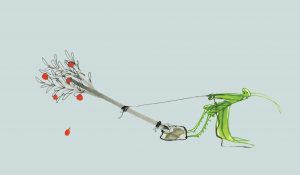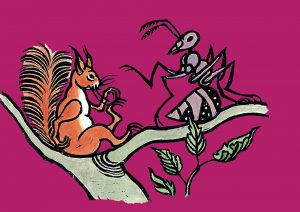'I have a hundred wishes, and if I think carefully maybe a thousand,' writes Toon Tellegen in The big cake book, which was published on the occasion of his seventy-fifth birthday today. 'But one wish is my dearest wish, and that is to sit among the animals on the riverbank one afternoon in early summer. I will say almost nothing and no one will see anything special about me. It is a beautiful day and we sit back, chewing on blades of grass, listening to the lapping of the waves and talking about nothing in particular. Ah, I think, so this is the nothing in particular that animals are always talking about!'
A huge cake invasion followed. "It's the most ordinary day of my life. That is my dearest wish," the writer concludes. His seventy-fifth birthday will undoubtedly not be the most ordinary day of his life, but hopefully one with lots of cake. Because his characters like that too - water cake, failed cake, and of course Squirrel's favourite beechnut cake.

Tight rules
Toon Tellegen is perhaps our country's most visible yet invisible writer. In more than 30 years, he has written an awe-inspiring oeuvre, but has avoided all publicity for years. He started out as a playwright and poet and still practices both genres. But he is best known for his wonderful animal stories, which grew out of the daily bedtime story he used to make up for his children.
Initially, he imposed strict rules on himself. For instance, the stories could not be much longer than a page and a half, only one animal of each species was allowed to take part and the animals were not given too distinct characters. Tellegen never knows in advance what he is going to write, the story arises under his hands. Often, the squirrel is the main character, whether or not accompanied by the ant. But there is a role for almost every animal imaginable, from the glow-worm, frog or heron, to the elephant, camel, grasshopper or vole. And sometimes the stories culminate in a 'novel', with one animal taking centre stage, such as The healing of the cricket, The departure of the ant or The hedgehog's desire.
Over the years, Tellegen created a unique universe. The forest where the animals live has a dreamy, languid, peaceful atmosphere. There is a bit of walking and musing, there are - lots of! - birthdays are celebrated, letters are written and parties are given, and above all lots of cake is eaten. Often, too, there is silence and the animals sit together contentedly, like the mussel who exclusively invites the squirrel to his party and they hardly exchange a word. "Towards the end of the afternoon, the clam said: 'Now you have to go. Bye.' He closed his shell and let himself drift away."
Characters
No matter which character takes centre stage, you can always recognise someone close to you (or yourself) in it. Because Tellegen's intention notwithstanding, the animals do have their own character and idiosyncrasies. The squirrel, for example, is friendly and loved by his fellow animals, but he also has a sometimes somewhat morose nature: "The squirrel walked back and forth across the room thinking. There were wrinkles on his forehead. Sometimes he got very tired and never wanted to think, but sometimes he also knew nothing and always wanted to think." His best friend, the ant, understands everything - or at least he thinks he does.
The frog always croaks over everyone, the hornet is a gruff, aggressive character, while the bear is such a glutton for food that he finishes all the goodies before anyone else has had a chance to taste them. The elephant is clumsy and clumsy, and thunders through other people's houses like a china shop, and also falls out of a tree every time he visits someone. Also funny is the secretary bird, who celebrates his birthday in writing and sends the squirrel a written cake. The latter informs him that the cake had been delicious: "'I savoured word for word,' he wrote. 'Especially I loved those stewed chestnuts, which were in brackets.' He sent the secretary bird a small, written table, as a gift, and a warm, handwritten hat for the winter."
Human emotions
Tellegen's work covers the full range of (human) feelings and emotions: joy, gloom, loneliness, anger, envy, insecurity. Downright moving, for instance, is the hedgehog, who is so lonely and longs for company that he only makes himself two cups of tea. "I am weird, frightening, lonely and insecure, I have spines, and I want someone to visit and I don't want anyone to visit... he thought. What an animal I am!"
Tellegen harnesses the power of repetition, using words or phrases literally, so a birthday cake can be so light-hearted "that you could only suspect it but not taste or see it", and a birthday present should definitely not be opened - after all, it should remain a surprise.
The stories are both melancholic and witty and often quite absurd. This makes Tellegen's work loved by children, but perhaps even more so by adults. As with the comics of Astérix and Obélix, which contain jokes that escape most children but are actually great fun for big people, in Toon Tellegen's animal stories, many things are incomprehensible to toddlers, but not to their parents who read the stories aloud.
Philosophy
The philosophical slant is often particularly comical. For instance, the beaver, who unwittingly builds a fence between the squirrel's and the ant's house, replies, when asked what the fence is for: "Well, what is the sky for, what am I for?" Or you can hear the elephant musing, "Really, what is real... I always find that such a broad concept." And the beetle on the flat steppe wonders if this is now "big and immense". Then he also gets thirsty. "What kind of thirst would it be?" he wondered. What kinds of thirst do you actually have? He did not know. But when he could no longer move his tongue because it stuck to his palate, he thought: this must be big thirst. He looked at the ground and thought: maybe this is unquenchable thirst!" Because his weariness is also great and unfathomable, the beetle tries to think only of very small things, "the smallest things he could think of".
It is this combination of a wondering and wondering gaze, the eyes of the adult as well as the child with which he looks around, that makes us as readers think and look at what seems obvious in a new way, and makes Toon Tellegen's work so special.
About Toon Tellegen
Toon Tellegen (born 18 November 1941) has always written and published widely in addition to his job as a GP. In 1966, he made his debut with the play Jimmy Walker. After several books of poetry, he published his first collection of animal stories, the genre for which he became best known, in 1984. Already with his second collection of animal stories, When no one had anything to do (1988) he won a Gouden Griffel. Tellegen is a jack-of-all-trades and a busy bee: every year since the 1980s, he has published one or more works of prose, poetry, drama or stories. The list of prizes awarded to Tellegen is also impressive: he won several Silver and Golden Griffels, the Woutertje Pieterse Prize twice, was awarded for the poetry collection A dance school (1993) was awarded the Jan Campert Prize, and his entire oeuvre was awarded the Theo Thijssen Prize (1997) and the Constantijn Huygens Prize (2007).



